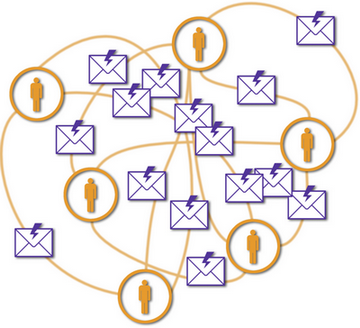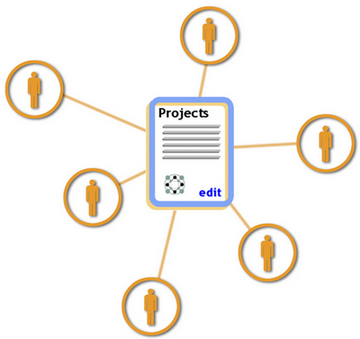|
Size: 36
Comment:
|
← Revision 63 as of 2008-10-03 20:18:59 ⇥
Size: 10139
Comment: converted to 1.6 markup
|
| Deletions are marked like this. | Additions are marked like this. |
| Line 1: | Line 1: |
| 在这里详述 JunHu/WikiYourWeb. | ## page was renamed from JunHu/WikiYourWeb #language en <<Action(Slideshow, Start Presentation)>> = Wiki, a Shared Blog for Distributed Teams, and for Everybody = Writable webs empower people to share knowledge effectively and to be more productive * Wiki, a Blog (Weblog) for groups: Communities can organize and share content in an organic and free manner * Extended with the right set of functionality, a Wiki can be applied to distributed teams to schedule, manage, document, and support their daily activities * The web as a whiteboard for everybody. ---- ~-Conference talk at VCWI 2005 IT Seminar in Eindhoven, Sept 2005<<BR>> Jun Hu <<BR>> <<MailTo(j.hu@tue.nl)>><<BR>> Slides available from [[http://id00243.id.tue.nl/JunHu/Events/WikiYourWeb]] -~ = Ways to create and share content and knowledge = * WikiPedia:Bulletin_board_system * WikiPedia:Internet_forum * WikiPedia:Email and WikiPedia:Mailing_list * WikiPedia:Web_page and WikiPedia:Content_management_system * WikiPedia:Weblog * WikiPedia:Wiki = Challenges of Static web pages = * Some content is outdated * When was the page last updated? * Incomplete content * Difficult to find content * Inconsistency across departments * Special tools, knowledge and permission required to maintain * Content is static, it has a '''webmaster syndrome''' If someone discovers a page with incorrect or insufficient information, (s)he will often ignore it because it takes too much time to find out who the webmaster is and to write an e-mail requesting an update = Challenges of Distributed Teams = * Open questions: * How to get virtual teams working together efficiently? * How to get everyone in sync? * How to avoid duplication of efforts? * Typical answers: * Scheduled conference calls * Occasional visits * Shared network disks * Instant Messaging (IRC, AIM, ICQ, etc) = Challenges of Distributed Teams = * E-mail and mailing lists are great, but: * Post and reply vs. post and __refine__ * Great for discussion, but ... hard to find "final consensus" on a thread * E-mail is not hyper-linked and is not structured, content can't be grouped easily into related topics * E-mail and attachments are not version controlled and it is difficult to determine the history of a document = Challenges of CMS = * Rigid structure (can be good and bad) * Control over content more important over free form knowledge sharing * Content is typically structured hierarchically or in table format, with limited cross-linking between pages * Limited support for unstructured content, or content that has "structure and exceptions" = User Generated Content = Forums:: Get lots of momentum and conversation happening, but things tend to vanish into the archives and get lost. Topics can also get off-track quickly Blogs:: More directed than forums, but less flexible. Wikis:: Most flexible, great ability to cross-link information. Potential to be ruined by vandalism / revert wars. Less structured format doesn't lend itself to debate / discussion / conversation as well, but can result in a more coherent final position. = Blogs vs. Wikis = * Blog: (Weblog) 1. Key: Easy to publish opinions of individual in regular intervals 1. Media to express individual voice 1. "Post media" (like e-mail), sometimes with feedback and talkback 1. Usually hosted service (e.g. Six Apart's [[http://www.typepad.com/|TypePad]]) * Wiki: (WikiWikiWeb) 1. Key: Easy to create and refactor on content owned by group 1. Media to express group voice, deemphasizing identity of individuals 1. "Refactor media", content may change at any time 1. Usually open source software, installed on own server * Some Blogs have Wiki-like features, some Wikis have Blog capabilities Merge over time? = Email vs. Wiki = || {{attachment:email.png}} || {{attachment:wiki.png}} || || email || wiki || = What is a Wiki? = * WikiWikiWeb = Writable Web * As quick to contribute as e-mail * As easy to use as a website * Wiki:WardCunningham implemented the original WikiWikiWeb in 1995 to collaborate on software patterns * Inspired by Wiki:HyperCard; some call it a Blog for groups * Wiki design principles: Open:: Should a page be found to be incomplete or poorly organized, any reader can edit it as they see fit Incremental:: Pages can cite other pages, including pages that have not been written yet Organic:: The structure and text content of the site is open to editing and evolution more:: Wiki:WikiDesignPrinciples = What is a Wiki? (cont.) = * The original WikiWikiWeb has these features: * Read-write web, every page can be edited using just a browser * HTML form based editing * Pages are served dynamically * Pages are linked automagically with camel case words LikeThis or words {{{["Like This"]}}} * Simple markup, no need to learn HTML * Try the WikiSandBox * Over 100 Wiki engines based on the original Wiki idea, mostly open source * Wiki has geek appeal * Mainly used by Internet communities and academia = Wiki Tools = * Open Source Wiki:WikiEngines: Download and install * MoinMoin: Used by internet communities (Python) * [[http://www.usemod.com/cgi-bin/wiki.pl|UseModWiki]]: Used by internet communities (Perl) * [[http://phpwiki.sourceforge.net/|PhpWiki]]: Popular Wiki (PHP) * [[http://www.flexwiki.com/|FlexWiki]]: .NET based (C#) * [[http://snipsnap.org/|SnipSnap]]: Wiki + Blog (Java) * Hosted Wiki services: Wiki farms * [[http://www.socialtext.com/products/workspace/|Socialtext Workspace]]: Open source Wiki (Kwiki) with Blog extensions; for corporate use ($$$) * [[http://www.editme.com/|EditMe]]: Simple Wiki and Blog ($4.95/month) * [[http://www.teamflux.com/FrontPage|Teamflux]]: Simple Wiki ($20/quarter/person) * Wiki appliance: Wiki in a preconfigured box * [[http://www.socialtext.com/products/appliance/|Socialtext Appliance]]: Based on Kwiki with some proprietary extensions = What is Wiki good for? = * Company Intranet * Community Builder * Educational Collaboration * Personal Web Site or Blog * Small Business Site * Online Notebook * Personal Information Manager = Examples: Wikipedia = {{attachment:wikipedia.png}} = Examples: Wikipedia (cont.) = * [[http://www.wikipedia.org/|Wikipedia]]: Wiki + Encyclopedia * A free encyclopedia that is being written collaboratively by its readers * Project started in January 2001 * The most active public Wiki: There are over 290,000 articles in English; more in 50 other languages * '''Anyone''' in the world can edit '''any''' page. * ''Doesn't that lead to chaos?'' * Domain experts contribute * Well defined policies for contributing and handling content * Graffiti gets removed quickly (rollback available) * IBM's [[http://researchweb.watson.ibm.com/history/|research]] on history flow of articles ([[http://researchweb.watson.ibm.com/history/gallery.htm|gallery]]) * Content can be freely distributed and reproduced under the terms of the [[http://en2.wikipedia.org/wiki/GNU_Free_Documentation_License,|GNU Free Documentation License]] = Examples: WordPress Manual = {{attachment:wordpress.png}} = Examples: Chinese Python = {{attachment:chinesepython.png}} = Examples: FreeDesktop.org = {{attachment:freedesktop.png}} = Examples: WikiTravel.org = {{attachment:wikitravel.png}} = Examples: Sensei's Library = {{attachment:sensei.png}} = Examples: Watermark Diary = {{attachment:hushui.png}} = Wiki Basics A = * Wikis are collections of pages: {{attachment:wikipages.png}} = Wiki Basics B = * Every page in a wiki is editable * Just click, type and save! {{attachment:wikieditable.png}} = Wiki Basics C = * Every page has a name * Linking to a page is as simple as writing its name {{attachment:wikilinks.png}} = Controlling changes = * Version control {{attachment:versioncontrol.png}} = Controlling changes = * Version control * diff {{attachment:diff.png}} = Controlling changes = * Version control * diff * recent changes {{attachment:recentchanges.png}} = Plain Text Editing = MoinMoin:: {{attachment:plaintext.png}} = Pesudo Rich Text Editing = Wikepedia:: {{attachment:pseudorichtext.png}} = Rich Text Editing = EditMe:: {{attachment:richtext.png}} = Live Demo = http://id00243.id.tue.nl/vcwi/WikiSandBox = Worries = * '''E-mail Habit''' - ''I prefer e-mail'' * (./) E-mail doesn't scale - new people, new technology, new customers, new partners... * '''Shared knowledge vs. 'Owners'''' - ''I don't want to edit someone else's page'' * (./) Wiki culture: nobody 'owns' pages, and any change can be built upon * (./) First person to create page is '''not''' the owner! * ''''No control' syndrome''' - ''This leads to chaos'' * (./) Wikis provide access control. * (./) Soft security, audit trail, peer review * '''Wiki syntax''' - ''yet another language'' * (./) Wiki is just plain text, e.g., just {{{'''do it'''}}}, you will '''do it''' * (./) Use the help pages, doesn't take long to learn = Questions and Answers = {{attachment:qna.gif}} = References = * Some of the content of this talk is from an excellent introduction to TWiki by [[TWiki:Main/PeterThoeny|Peter Thoeny]]: [[http://twiki.org/cgi-bin/view/Codev/TWikiPresentation11Aug2005|Wiki Collaboration and Wiki Applications for the Enterprise]] * Moin``Moin: see MoinMoin:Frontpage. This is the wiki I am using to give this presentation. * [[http://computer.howstuffworks.com/wiki.htm|Wikis]] at How``Stuff``Works * More introduction about Wiki see WikiPedia:Wiki entry on Wikipedia. For people who are seriously interested:: * The Wiki way: quick collaboration on the Web, B Leuf, W Cunningham - 2001 - Boston: Addison-Wesley * Emerging Technologies: Blogs and Wikis: Environments for On-line Collaboration B Godwin-Jones, A Tools, S Tools - Language Learning & Technology, 2003 |
Start Presentation
Wiki, a Shared Blog for Distributed Teams, and for Everybody
Writable webs empower people to share knowledge effectively and to be more productive
- Wiki, a Blog (Weblog) for groups: Communities can organize and share content in an organic and free manner
- Extended with the right set of functionality, a Wiki can be applied to distributed teams to schedule, manage, document, and support their daily activities
- The web as a whiteboard for everybody.
Conference talk at VCWI 2005 IT Seminar in Eindhoven, Sept 2005
Jun Hu
<j.hu@tue.nl>
Slides available from http://id00243.id.tue.nl/JunHu/Events/WikiYourWeb
Ways to create and share content and knowledge
Email and Mailing_list
Challenges of Static web pages
- Some content is outdated
- When was the page last updated?
- Incomplete content
- Difficult to find content
- Inconsistency across departments
- Special tools, knowledge and permission required to maintain
Content is static, it has a webmaster syndrome
- If someone discovers a page with incorrect or insufficient information, (s)he will often ignore it because it takes too much time to find out who the webmaster is and to write an e-mail requesting an update
Challenges of Distributed Teams
- Open questions:
- How to get virtual teams working together efficiently?
- How to get everyone in sync?
- How to avoid duplication of efforts?
- Typical answers:
- Scheduled conference calls
- Occasional visits
- Shared network disks
- Instant Messaging (IRC, AIM, ICQ, etc)
Challenges of Distributed Teams
- E-mail and mailing lists are great, but:
Post and reply vs. post and refine
- Great for discussion, but ... hard to find "final consensus" on a thread
- E-mail is not hyper-linked and is not structured, content can't be grouped easily into related topics
- E-mail and attachments are not version controlled and it is difficult to determine the history of a document
Challenges of CMS
- Rigid structure (can be good and bad)
- Control over content more important over free form knowledge sharing
- Content is typically structured hierarchically or in table format, with limited cross-linking between pages
- Limited support for unstructured content, or content that has "structure and exceptions"
User Generated Content
- Forums
- Get lots of momentum and conversation happening, but things tend to vanish into the archives and get lost. Topics can also get off-track quickly
- Blogs
- More directed than forums, but less flexible.
- Wikis
- Most flexible, great ability to cross-link information. Potential to be ruined by vandalism / revert wars. Less structured format doesn't lend itself to debate / discussion / conversation as well, but can result in a more coherent final position.
Blogs vs. Wikis
- Blog: (Weblog)
- Key: Easy to publish opinions of individual in regular intervals
- Media to express individual voice
- "Post media" (like e-mail), sometimes with feedback and talkback
Usually hosted service (e.g. Six Apart's TypePad)
Wiki: (WikiWikiWeb)
- Key: Easy to create and refactor on content owned by group
- Media to express group voice, deemphasizing identity of individuals
- "Refactor media", content may change at any time
- Usually open source software, installed on own server
- Some Blogs have Wiki-like features, some Wikis have Blog capabilities
- Merge over time?
Email vs. Wiki
|
|
wiki |
What is a Wiki?
WikiWikiWeb = Writable Web
- As quick to contribute as e-mail
- As easy to use as a website
WardCunningham implemented the original WikiWikiWeb in 1995 to collaborate on software patterns
Inspired by HyperCard; some call it a Blog for groups
- Wiki design principles:
- Open
- Should a page be found to be incomplete or poorly organized, any reader can edit it as they see fit
- Incremental
- Pages can cite other pages, including pages that have not been written yet
- Organic
- The structure and text content of the site is open to editing and evolution
- more
What is a Wiki? (cont.)
The original WikiWikiWeb has these features:
- Read-write web, every page can be edited using just a browser
- HTML form based editing
- Pages are served dynamically
Pages are linked automagically with camel case words LikeThis or words ["Like This"]
- Simple markup, no need to learn HTML
Try the WikiSandBox
- Over 100 Wiki engines based on the original Wiki idea, mostly open source
- Wiki has geek appeal
- Mainly used by Internet communities and academia
Wiki Tools
Open Source WikiEngines: Download and install
MoinMoin: Used by internet communities (Python)
UseModWiki: Used by internet communities (Perl)
PhpWiki: Popular Wiki (PHP)
FlexWiki: .NET based (C#)
SnipSnap: Wiki + Blog (Java)
- Hosted Wiki services: Wiki farms
Socialtext Workspace: Open source Wiki (Kwiki) with Blog extensions; for corporate use ($$$)
EditMe: Simple Wiki and Blog ($4.95/month)
Teamflux: Simple Wiki ($20/quarter/person)
- Wiki appliance: Wiki in a preconfigured box
Socialtext Appliance: Based on Kwiki with some proprietary extensions
What is Wiki good for?
- Company Intranet
- Community Builder
- Educational Collaboration
- Personal Web Site or Blog
- Small Business Site
- Online Notebook
- Personal Information Manager
Examples: Wikipedia
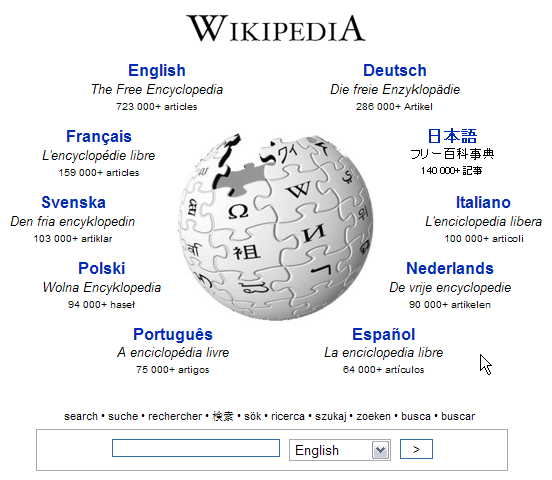
Examples: Wikipedia (cont.)
Wikipedia: Wiki + Encyclopedia
- A free encyclopedia that is being written collaboratively by its readers
- Project started in January 2001
- The most active public Wiki: There are over 290,000 articles in English; more in 50 other languages
Anyone in the world can edit any page.
Doesn't that lead to chaos?
Content can be freely distributed and reproduced under the terms of the GNU Free Documentation License
Examples: WordPress Manual
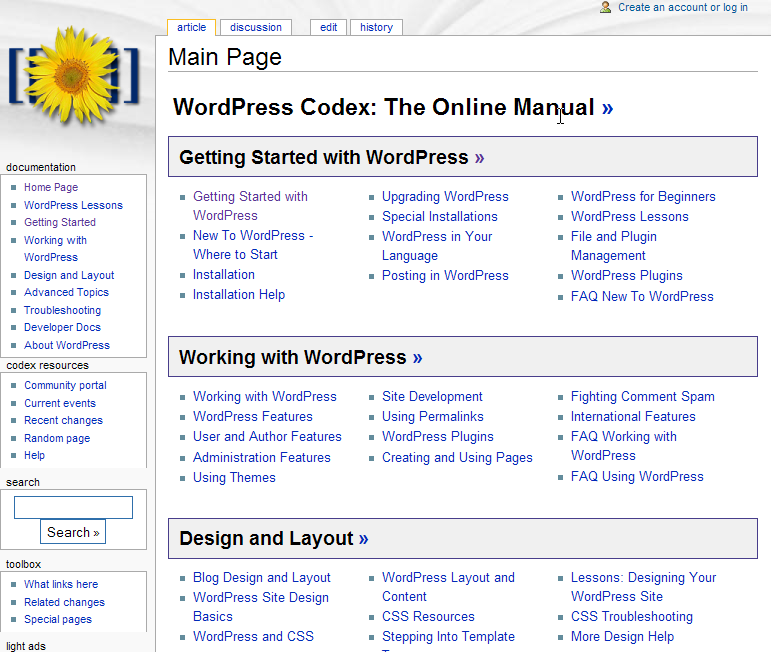
Examples: Chinese Python
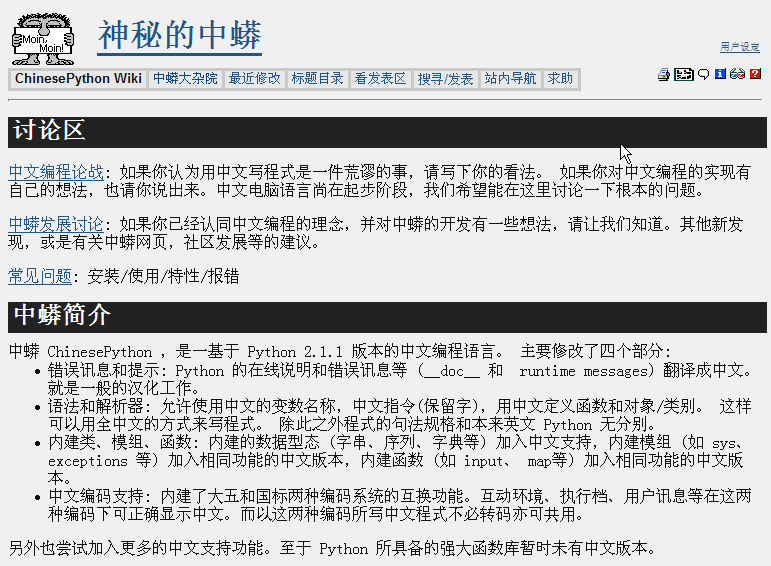
Examples: FreeDesktop.org
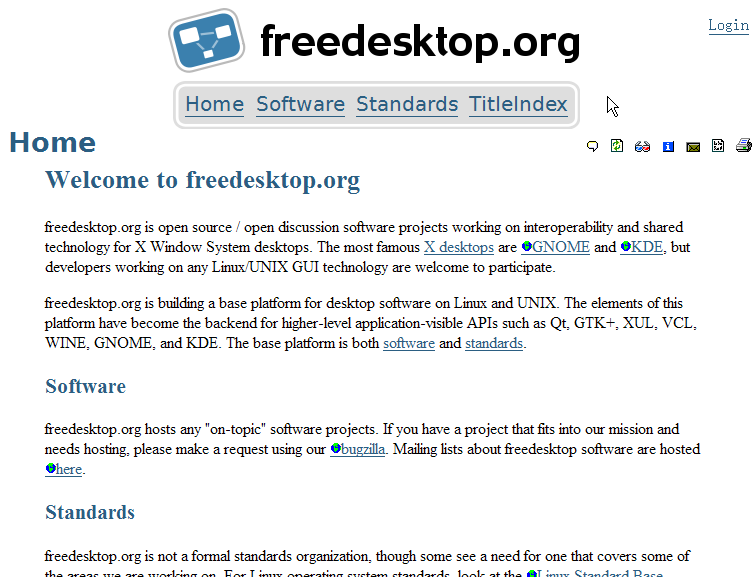
Examples: WikiTravel.org
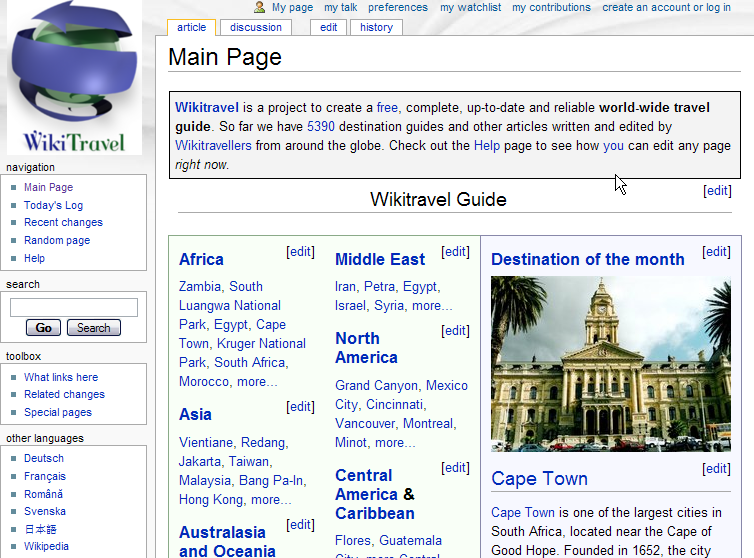
Examples: Sensei's Library
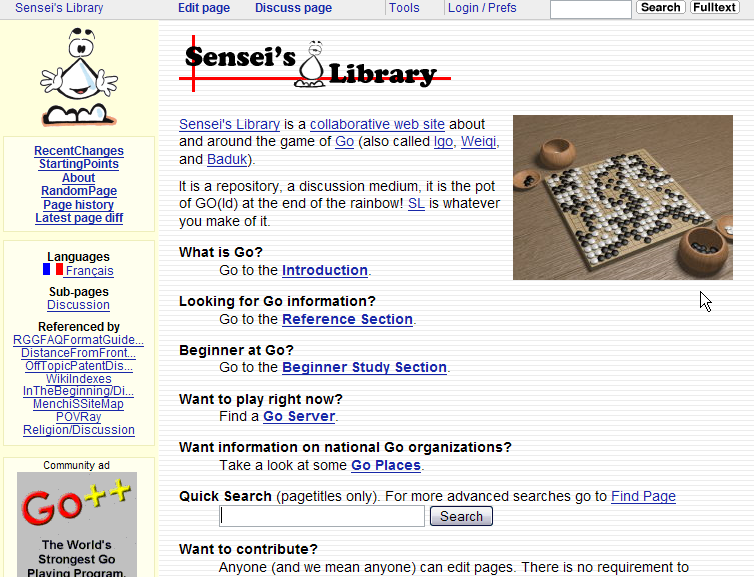
Examples: Watermark Diary
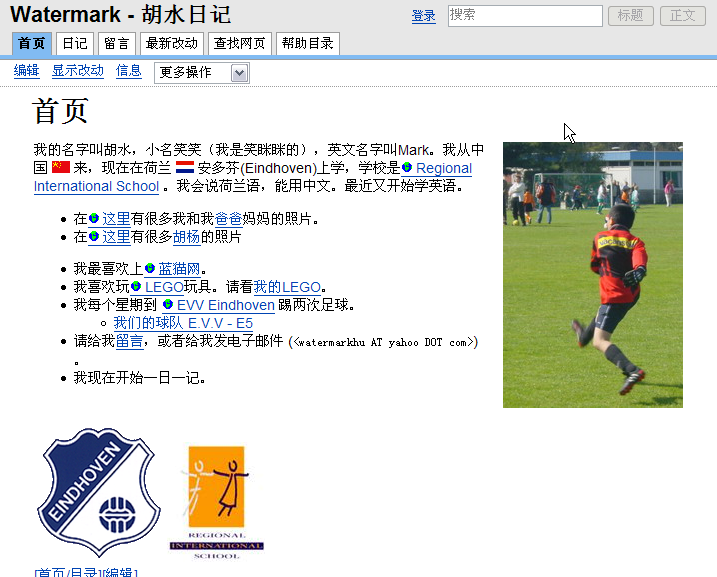
Wiki Basics A
- Wikis are collections of pages:

Wiki Basics B
- Every page in a wiki is editable
- Just click, type and save!

Wiki Basics C
- Every page has a name
- Linking to a page is as simple as writing its name
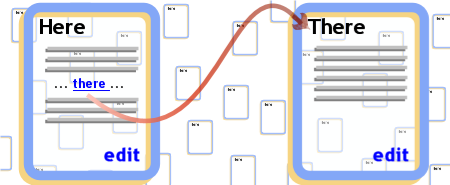
Controlling changes
- Version control
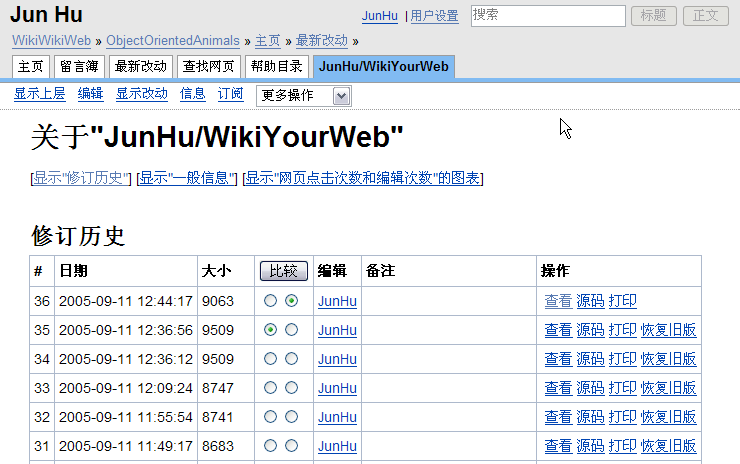
Controlling changes
- Version control
- diff
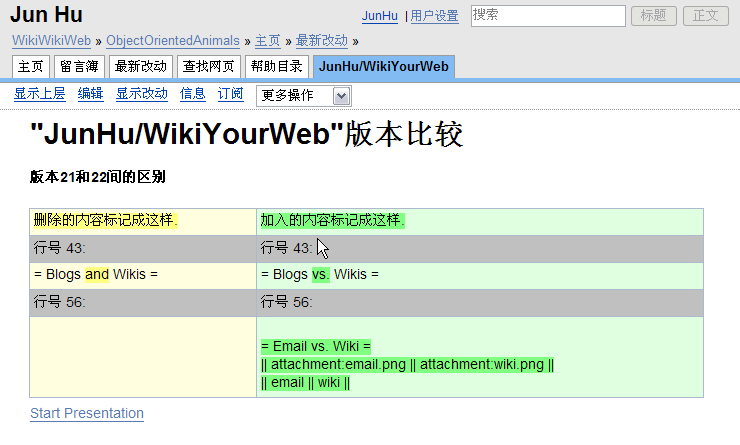
Controlling changes
- Version control
- diff
- recent changes
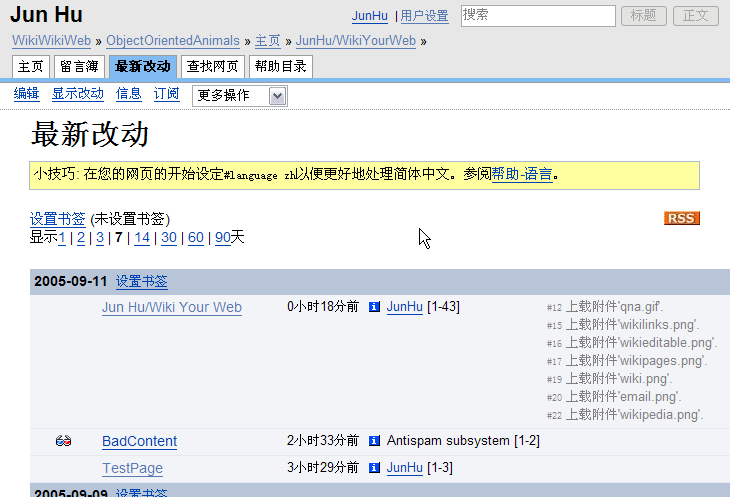
Plain Text Editing
- MoinMoin
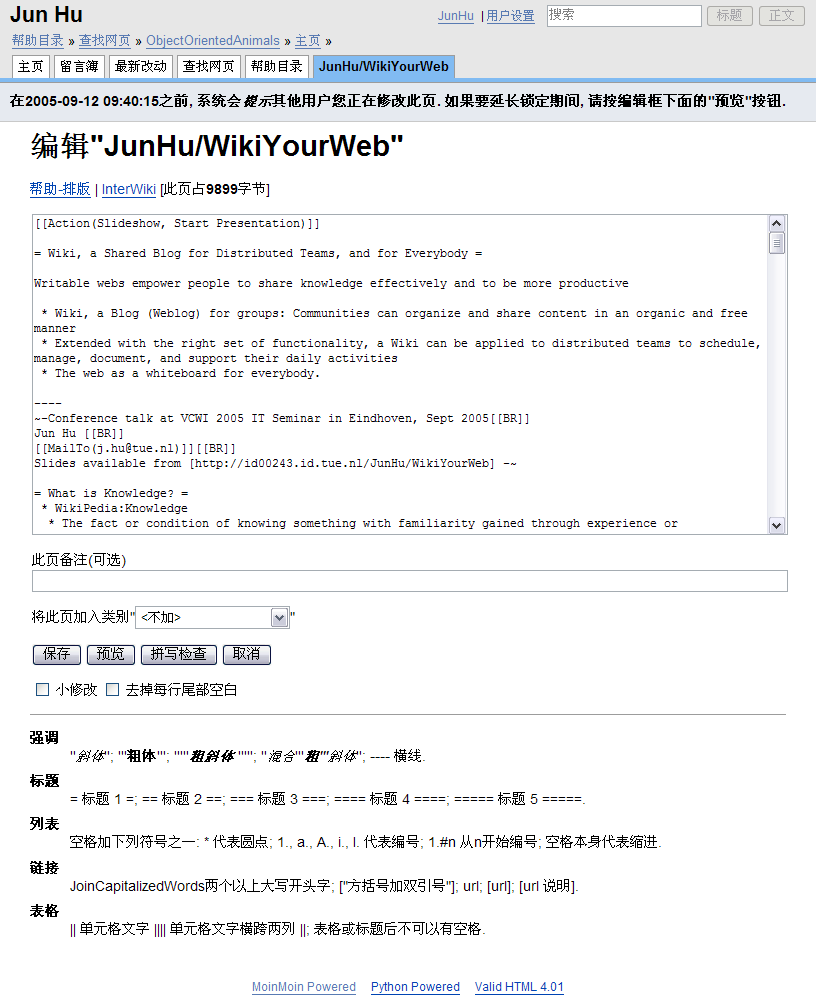
Pesudo Rich Text Editing
- Wikepedia
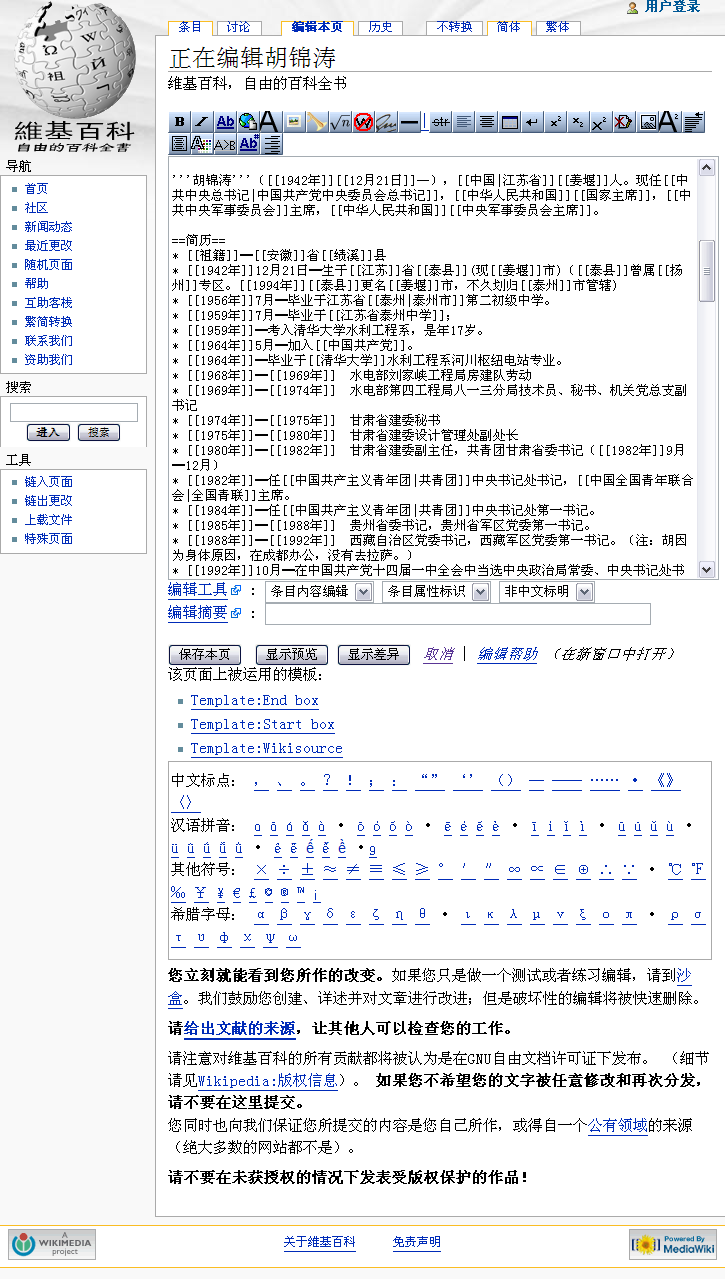
Rich Text Editing
- EditMe
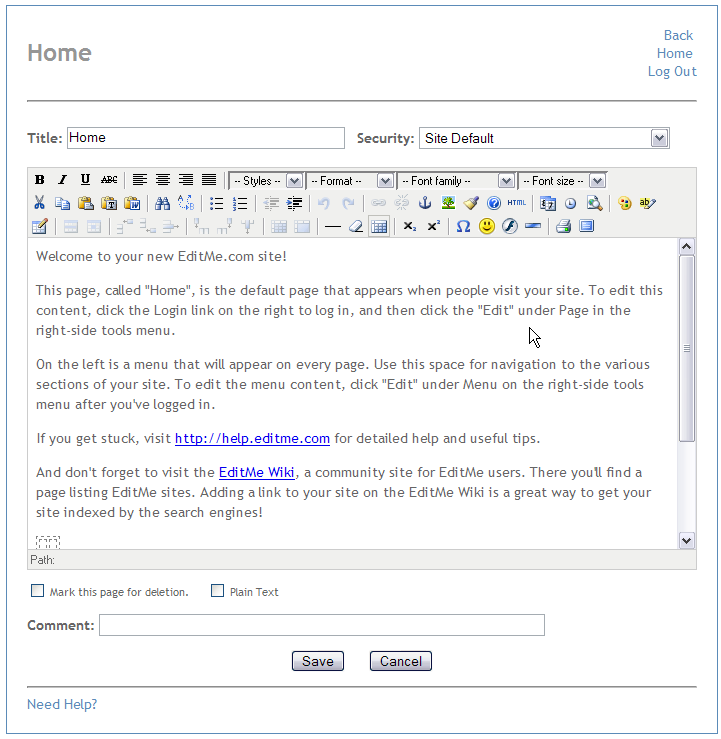
Live Demo
Worries
E-mail Habit - I prefer e-mail
 E-mail doesn't scale - new people, new technology, new customers, new partners...
E-mail doesn't scale - new people, new technology, new customers, new partners...
Shared knowledge vs. 'Owners' - I don't want to edit someone else's page
 Wiki culture: nobody 'owns' pages, and any change can be built upon
Wiki culture: nobody 'owns' pages, and any change can be built upon  First person to create page is not the owner!
First person to create page is not the owner!
'No control' syndrome - This leads to chaos
 Wikis provide access control.
Wikis provide access control.  Soft security, audit trail, peer review
Soft security, audit trail, peer review
Wiki syntax - yet another language
 Wiki is just plain text, e.g., just '''do it''', you will do it
Wiki is just plain text, e.g., just '''do it''', you will do it  Use the help pages, doesn't take long to learn
Use the help pages, doesn't take long to learn
Questions and Answers
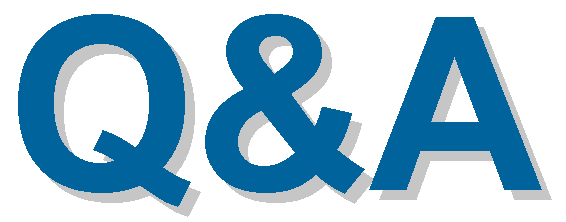
References
Some of the content of this talk is from an excellent introduction to TWiki by Peter Thoeny: Wiki Collaboration and Wiki Applications for the Enterprise
MoinMoin: see Frontpage. This is the wiki I am using to give this presentation.
Wikis at HowStuffWorks
More introduction about Wiki see Wiki entry on Wikipedia.
- For people who are seriously interested
- The Wiki way: quick collaboration on the Web, B Leuf, W Cunningham - 2001 - Boston: Addison-Wesley
Emerging Technologies: Blogs and Wikis: Environments for On-line Collaboration B Godwin-Jones, A Tools, S Tools - Language Learning & Technology, 2003

